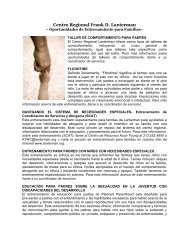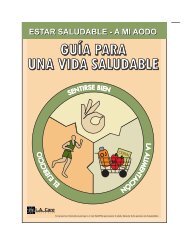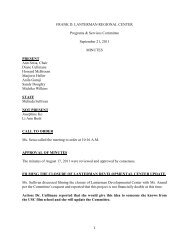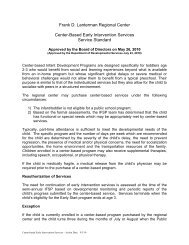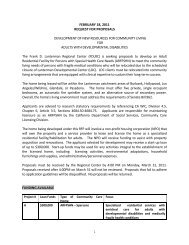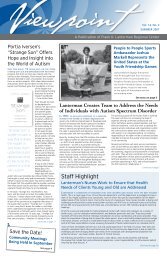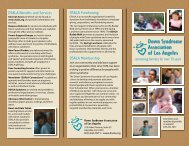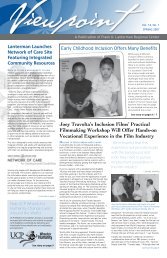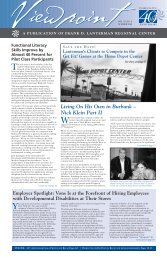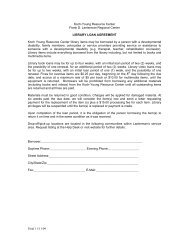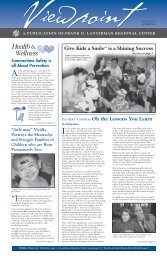Guide to Lanterman for Early Start Families - Frank D. Lanterman ...
Guide to Lanterman for Early Start Families - Frank D. Lanterman ...
Guide to Lanterman for Early Start Families - Frank D. Lanterman ...
You also want an ePaper? Increase the reach of your titles
YUMPU automatically turns print PDFs into web optimized ePapers that Google loves.
Moni<strong>to</strong>ring Your Child’s Progress<br />
At least every six months, the service coordina<strong>to</strong>r reviews<br />
with the family the child’s progress in achieving the outcomes<br />
identified in the IFSP and discusses the need <strong>for</strong> any changes <strong>to</strong><br />
the plan. Once the Regional Center and the family have agreed<br />
on changes, the service coordina<strong>to</strong>r writes a plan amendment<br />
and the parents indicate their agreement by signing the<br />
amendment. The service coordina<strong>to</strong>r is required <strong>to</strong> complete an<br />
amendment within 15 days.<br />
FAQ<br />
What is required <strong>to</strong> maintain active status?<br />
A child’s status with <strong>Lanterman</strong> remains active as long<br />
as he or she is receiving services, including service<br />
coordination and maintaining a current IFSP.<br />
A child’s status becomes inactive when the family chooses<br />
<strong>to</strong> no longer receive services from the Regional Center<br />
and asks <strong>for</strong> the status <strong>to</strong> be changed, or when the Center<br />
loses <strong>to</strong>uch with the family.<br />
For this reason, it is important that families keep<br />
<strong>Lanterman</strong> in<strong>for</strong>med of their current address. If we<br />
are unable <strong>to</strong> contact a family by mail and phone, we<br />
visit the last known address. If these attempts fail, we<br />
designate the child’s status as inactive. The family may<br />
ask <strong>for</strong> the case <strong>to</strong> be reactivated at any time.<br />
Examples of IFSP Outcomes and Criteria<br />
Following are examples of IFSP outcomes and criteria that describe how the team will know whether progress is<br />
being made.<br />
Outcome 1<br />
Cameron will communicate his wants and needs in a clear way.<br />
Criteria (How will we know if we are making progress?):<br />
• Cameron will point <strong>to</strong> body parts and common objects and accurately<br />
name them.<br />
• Cameron will use single words <strong>to</strong> express his wants and needs consistently.<br />
• Cameron will use two- <strong>to</strong> three-word phrases <strong>to</strong> communicate his wants and<br />
needs consistently.<br />
Outcome 2<br />
Holly will play with other children her own age.<br />
Criteria (How will we know if we are making progress?):<br />
• Holly will initiate interaction with other children her own age.<br />
• Holly will take turns with other children in play settings.<br />
• Holly will share her <strong>to</strong>ys with other children without being asked.<br />
Outcome 3<br />
Charlie will improve his mo<strong>to</strong>r skills <strong>to</strong> a level appropriate <strong>for</strong> his age.<br />
Criteria (How will we know if we are making progress?):<br />
• Charlie will walk without support.<br />
• Charlie will ride a tricycle.<br />
• Charlie will catch a large ball.<br />
<strong>Guide</strong> <strong>to</strong> <strong>Lanterman</strong> Regional Center <strong>for</strong> <strong>Early</strong> <strong>Start</strong> <strong>Families</strong><br />
15



